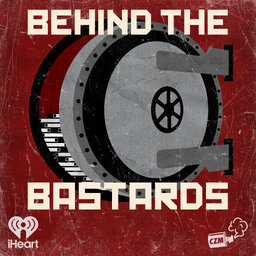Robert is joined by Paul F. Tompkins to discuss Rush Limbaugh.
FOOTNOTES:
- https://www.latimes.com/archives/la-xpm-2006-apr-29-na-limbaugh29-story.html
- https://www.theguardian.com/world/2003/oct/11/usa.julianborger1
- https://longreads.com/2019/03/15/how-the-shock-jock-became-the-outrage-jock/
- https://www.vanityfair.com/news/2009/05/rush-limbaugh200905
- https://newrepublic.com/article/161405/rush-limbaugh-racist-sexist-conservative-media-worse
- https://www.metroweekly.com/2021/02/rush-limbaugh-mocked-gay-people-dying-from-aids-on-his-radio-show/
- https://www.nytimes.com/1990/12/16/magazine/the-rush-hours.html
- https://www.businessinsider.com/presidential-medal-awardee-rush-limbaughs-racist-and-sexist-comments-2020-2
- https://www.politico.com/story/2012/03/10-things-you-didnt-know-about-rush-073661
- https://www.nytimes.com/2021/02/20/opinion/politics/rush-limbaugh-conservative-media.html
- https://www.snopes.com/fact-check/rush-limbaugh-draft/
- https://people.com/politics/rush-limbaugh-most-controversial-moments/
- https://www.rollingstone.com/politics/politics-features/rush-limbaugh-dead-trump-ruined-america-1129222/
- https://www.vanityfair.com/news/2007/05/wolcott200705
- https://www.chicagotribune.com/news/ct-xpm-2003-10-15-0310150127-story.html
- https://twitter.com/AmITooRemoved/status/1362201339472740355
- https://qz.com/1973960/rush-limbaughs-short-lived-tv-show-helped-usher-in-fox-news/
- https://www.snopes.com/fact-check/rush-limbaugh-racist-quotes/
- https://www.youtube.com/watch?v=FPgO9NLy-7A
- https://www.youtube.com/watch?v=Oc-aDkrKgSk
Learn more about your ad-choices at https://www.iheartpodcastnetwork.com
In 1 playlist(s)
Behind the Bastards
There’s a reason the History Channel has produced hundreds of documentaries about Hitler but only a …Social links
Follow podcast
Recent clips

The Greg Bovino Episode Extravaganza!
1:19:38

Part Three: Romana Didulo: Queen of Canada
48:03

Part Two: Romana Didulo: Queen of Canada
1:10:37
 Behind the Bastards
Behind the Bastards